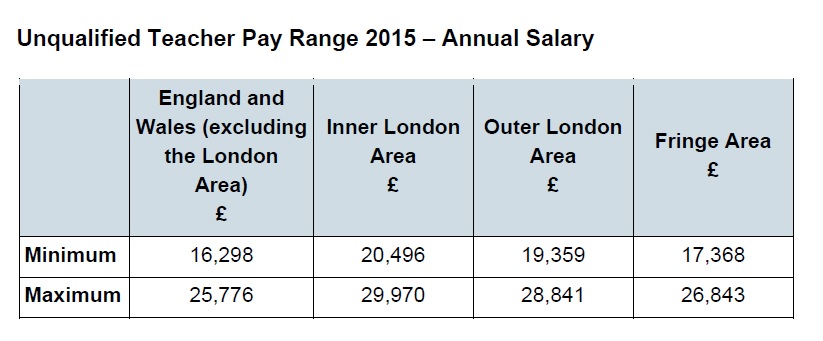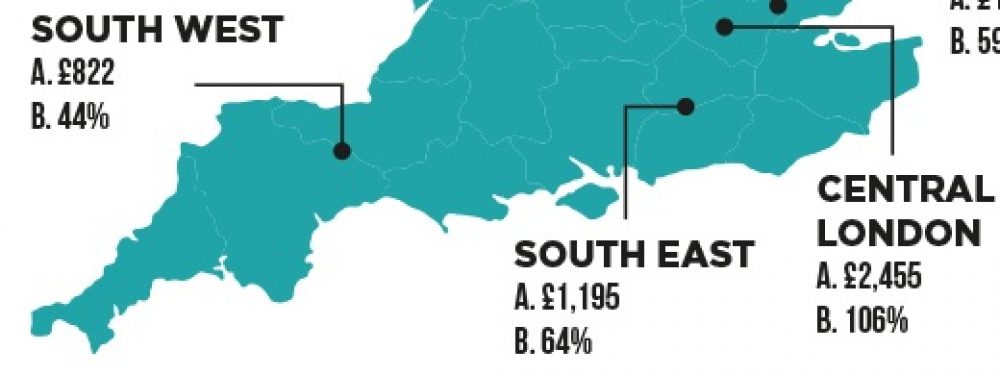Teachers living in London and the South East of England are facing unaffordable accommodation costs, a Schools Week investigation has found.
Analysis of the latest average rent prices show new teachers in the South East are paying up to 64 per cent of their monthly salary for housing.
In outer London, average rent costs are 59 per cent of salaries – even though teachers are paid an extra £3,000 in the capital.
Home letting experts say affordable rents are no more than 40 per cent of a tenant’s gross income.
However in central London – where the average rent for a new let this year is £2,455 – the entire starting annual pay for a newly qualified teacher of £27,819 would not cover this cost.
Schools Week has spoken to frustrated teachers who say the high cost of living is driving them away from the capital.
If I’m still teaching in two years, it won’t be in London
Charles Hanen, a third year design and technology teacher in a zone one London school, pays £750 per month to live in a ground-floor flat in Holloway Road.
“I wanted to live within 40 minutes of work, but it’s impossible to save money,” he said. “I do live frugally and make my own lunches, but sometimes to go out and see friends just costs too much.”
His zone one and two travel card costs another £120 per month, and Mr Hanen added: “It’s just too expensive to live, the quality of life is much lower than teachers in other areas.
“I can’t see it will be financially sustainable to stay in London after the next two years. If I’m still teaching – it definitely won’t be in London.”
Schools Week compared residential letting figures published by estate agents Countrywide in July against the 2015 minimum pay levels for new teachers. 
We found teachers in the capital’s centre were paying the greatest proportion of their salary, but the numbers who live there are low, with most London workers commuting from areas on the fringes.
Excluding central London, teachers in the South East fared worst. Average rental costs have hit £1,195 per month, while first year teachers take home just £1,854 each month before tax.
The lowest rent outgoings were in the Midlands (36 per cent) and the North (35 per cent).

The gap between rent and pay is also much narrower when tax, national insurance and student loan deductions are taken out.
After these deductions, NQTs on the lowest wage receive just £17,733 per year. In the South East, once average rent is paid, a new teacher would be left with just £65 per week for all other expenses.
The picture is even worse for unqualified teachers, who start on a pre-tax wage of £16,298 outside London. The latest figures show a 20 per cent surge in the number of unqualified teachers. As of November there were 20,300 across the country.

Teachers can take on extra responsibilities to bump up their pay. Mr Hanen earns an extra £2,500 a year from his head of politics role.
However he said: “This really doesn’t feel like a lot after tax has been taken off – I’m 25 and I still want to enjoy myself and just can’t do it, it’s frustrating.”
Alanya Noquet, a year 1 teacher at an east London primary school, has taken to private tutoring on her weekends. “In my first year of teaching I was doing five hours per weekend, it’s £40 per hour. A lot of teacher friends do it because it’s good money.
Ms Noquet has taken to private tutoring on her weekends.
“But it means extra planning and just eats into your free time, I was finding it hard to keep up with the normal job.”
The 26-year-old, who has a Master’s degree from St Andrew’s University, now tutors for two hours a weekend, which leaves her with “a few hundred pounds spare after all the outgoings to last each month”.
“I’m living hand to mouth,” she said. “I’m still paying £250 per month off my career development loan for my masters, the payments have been crippling.”
She’s had to move further away from her school and now pays £695, including bills, to share a flat with two other girls in Brockley.
 Jenny Moore (pictured left), a researcher specialising in staff matters at school advice organisation The Key, said: “While schools have the flexibility to pay a higher salary or offer recruitment incentives, the question is whether they have the money to do so, given that staffing costs already eat up a large chunk of a school’s budget. They may also not want to risk upsetting existing staff.”
Jenny Moore (pictured left), a researcher specialising in staff matters at school advice organisation The Key, said: “While schools have the flexibility to pay a higher salary or offer recruitment incentives, the question is whether they have the money to do so, given that staffing costs already eat up a large chunk of a school’s budget. They may also not want to risk upsetting existing staff.”
She also said some schools offer recruitment incentives including cycle to work schemes and helping out with relocation costs.
It was reported earlier this month that South Farnham School, in Surrey, was renting out the on-site caretaker’s house to three teachers.
Head Sir Andrew Carter said: “There are not many teacher out there, particularly in the South East … the general principle is to help people, and support them.”







Your thoughts